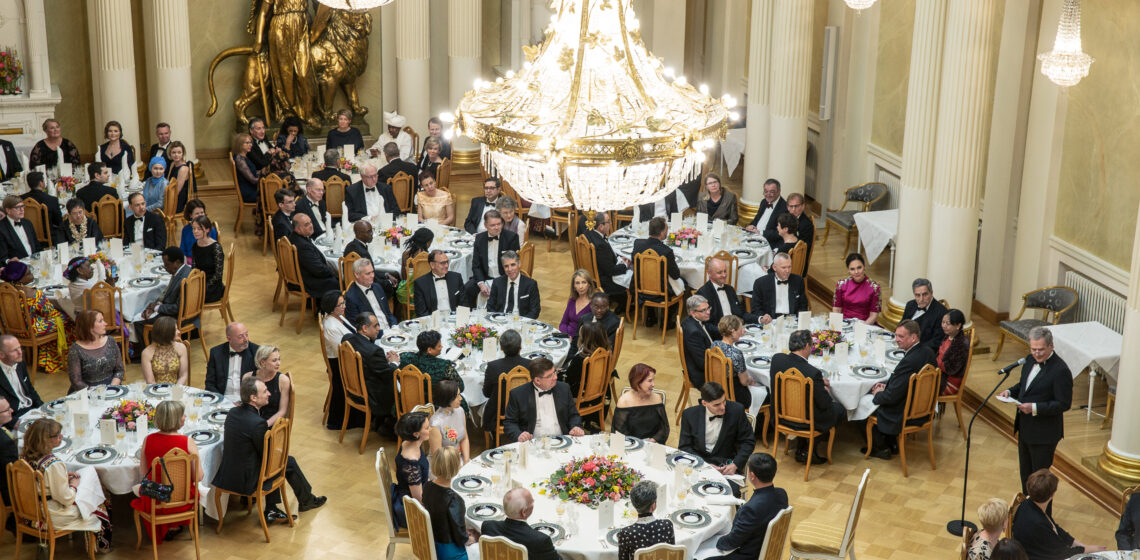Photo: Juhani Kandell/Office of the President of the Republic of Finland
Excellencies, ladies and gentlemen,
It is once again a pleasure to welcome you all to the Presidential Palace. As always, this dinner represents both continuity and change.
Continuity, in following the tradition of bringing together the Ambassadors from the entire diplomatic community once a year.
Change, in welcoming the new arrivals to this community. Almost thirty of you have presented your credentials during the past twelve months and join this gathering for the first time.
Allow me to take this opportunity to thank you all for your precious work to advance our relations.
Unfortunately, we have also received very sad news this week. We have lost one of the most recently arrived colleagues of yours. I want to express my deepest condolences to the family of Ambassador Moon and to the Embassy of the Republic of Korea.
* * *
In Finnish politics, this spring is a time of change. Plenty of new faces have entered Parliament – and there are now more female members than ever before. The negotiations to form a new government are about to begin.
This kind of renewal is normal after parliamentary elections. But the election last month also confirmed new features in our political landscape. The support for the largest parties has fallen, and others have caught up. The margins have become smaller. Not a single party received more than 18 percent of the vote.
Ever since the early 1980s we have been used to stable majority governments, staying in office for the full four-year term. This decade has already witnessed some deviations from this rule, but the general trend has persisted.
For coalition governments to work, commitment to common objectives is key. In these new circumstances it is even more important than before. Commitment is desirable not only in order to achieve the goals the government sets in its programme. It will also serve the continued stability of our democracy. If everybody begins to seek short-term gains, we will all lose in the long term.
Regardless of the domestic changes, there is one area where you can count on continuity. Throughout my term in office, I have regularly engaged the leaders of all parliamentary parties in discussions on foreign and security policy. Our thinking on Finland’s international position and the main pillars of Finland’s security is well aligned. I am therefore confident that the successful cooperation in leading Finland’s foreign policy continues also with the new government.
* * *
For Finnish diplomacy, this is a year of three chairmanships or presidencies. Two of them will run out in the next two weeks, those in the Arctic Council and the Council of Europe. The third one, in the European Union, will begin in less than two months.
It is not an easy time to assume leadership in the European Union. Our continent is going through turbulent changes. The uncertain outcome of the upcoming European election, the apparently inevitable departure of the United Kingdom, and a number of disagreements between remaining members – these elements often dominate the view we have of the Union.
But we should not allow these challenges to distort the bigger picture. At the start of our Presidency, I would like to pose the leaders of the other member states a simple, provocative question: Do we still have something in common?
Honest answers to this question should immediately reveal the reality. Despite some real differences, there is much more that binds us together. Not only our common values, but also our common interests.
And most of those common interests are not restricted to Europe. They are global in nature. Terrorism, nuclear weapons, new technologies, climate change, migration – all these challenges can only be managed together. They require close cooperation. Above all, they require diplomacy.
* * *
In his new memoir, summing up his long career in the US foreign service, William Burns defines diplomacy as “the main instrument we employ to manage foreign relations, reduce risks and exploit opportunities to advance our security and prosperity”.
As tensions in international politics are on the rise, and the trust in agreements and institutions in decline, I have been deeply worried about predictions of an “end of diplomacy”. We cannot afford to lose this instrument. If anything, our time calls for more diplomacy, not less. Diplomacy is what provides order and structure to our relations. The continuity it brings helps us to manage change.
In his book, Burns continues to note that much of diplomacy unfolds out of sight and out of mind. He writes, “Its successes are rarely celebrated, its failures almost always scrutinized.”
This evening is one of those rare occasions for celebration. I would like to propose a toast to the successes of diplomacy, and to the hope of many more to come.


